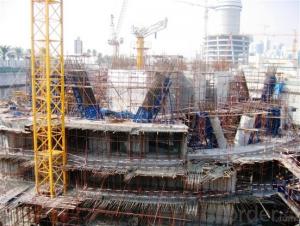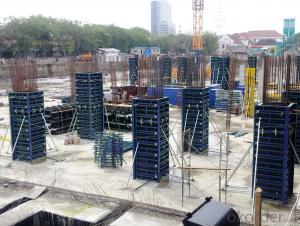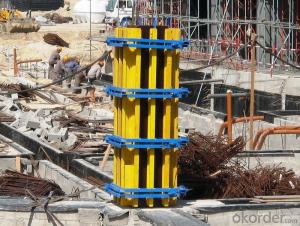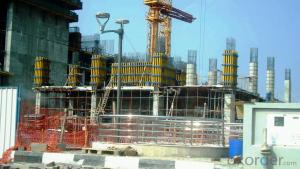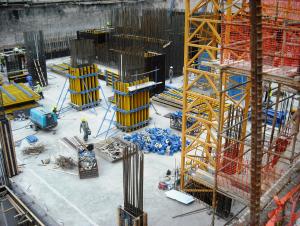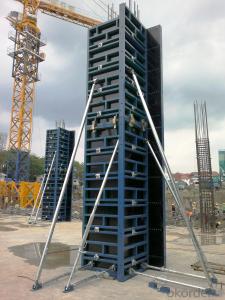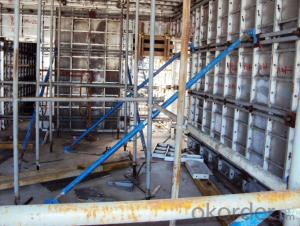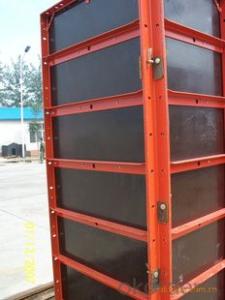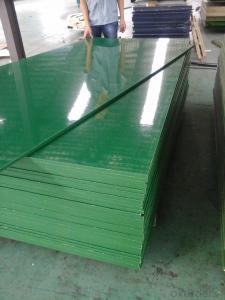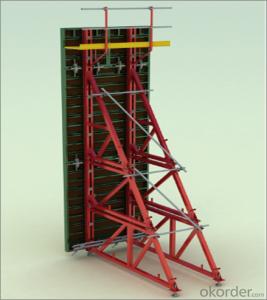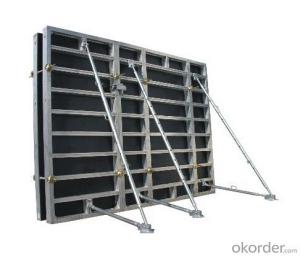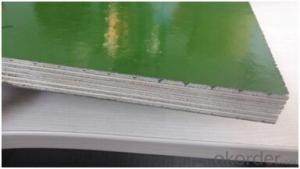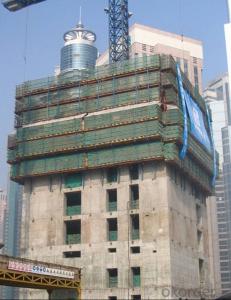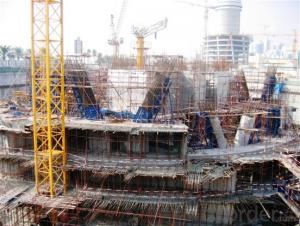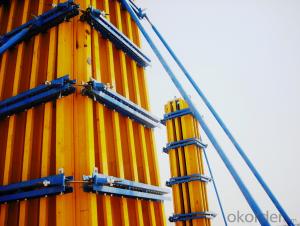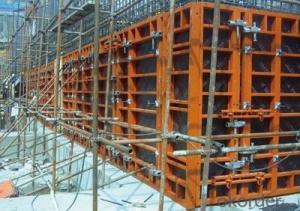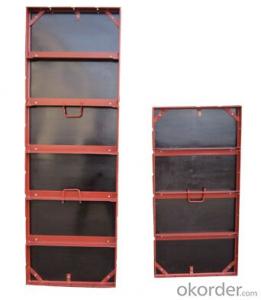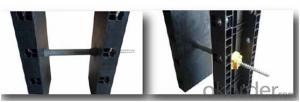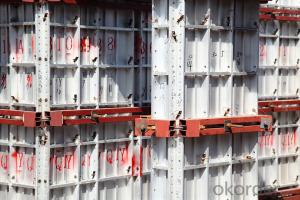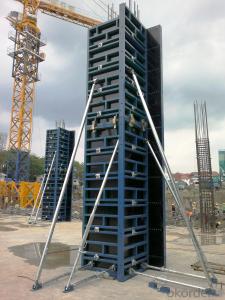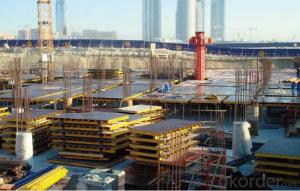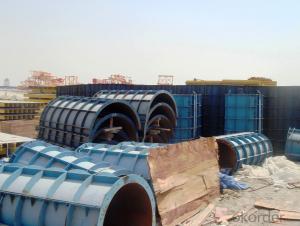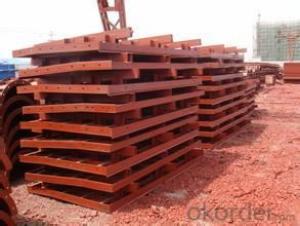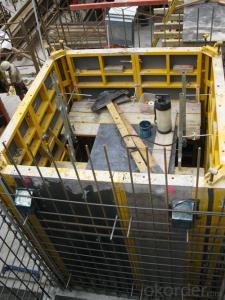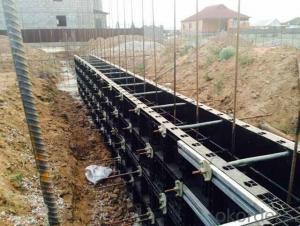High Stiffness Concrete Column Formwork
- Loading Port:
- China Main Port
- Payment Terms:
- TT OR LC
- Min Order Qty:
- -
- Supply Capability:
- -
OKorder Service Pledge
OKorder Financial Service
You Might Also Like
Detailed Product Description
concrete column formwork
wooden column formwork
circular column formwork
High Stiffness Concrete Column Formwork For Pouring Circular Column
Description:
1. Structure sketch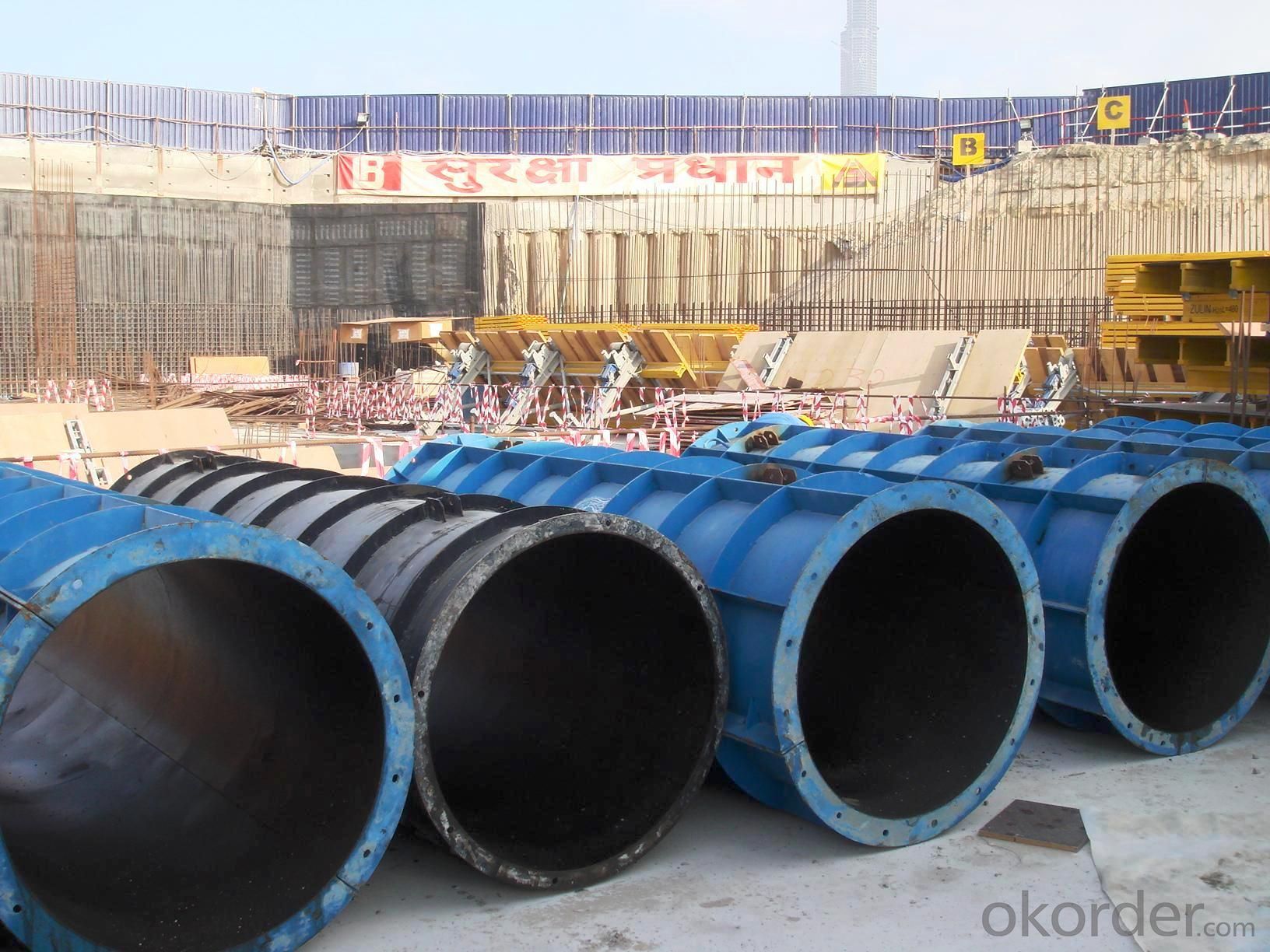
SC system is a kind of formwork for pouring circular column; it is composed of two pieces of steel formwork, props, connectors, etc.
Competitive Advantage:
1. No assembling for formwork, easy operation with formed formwork.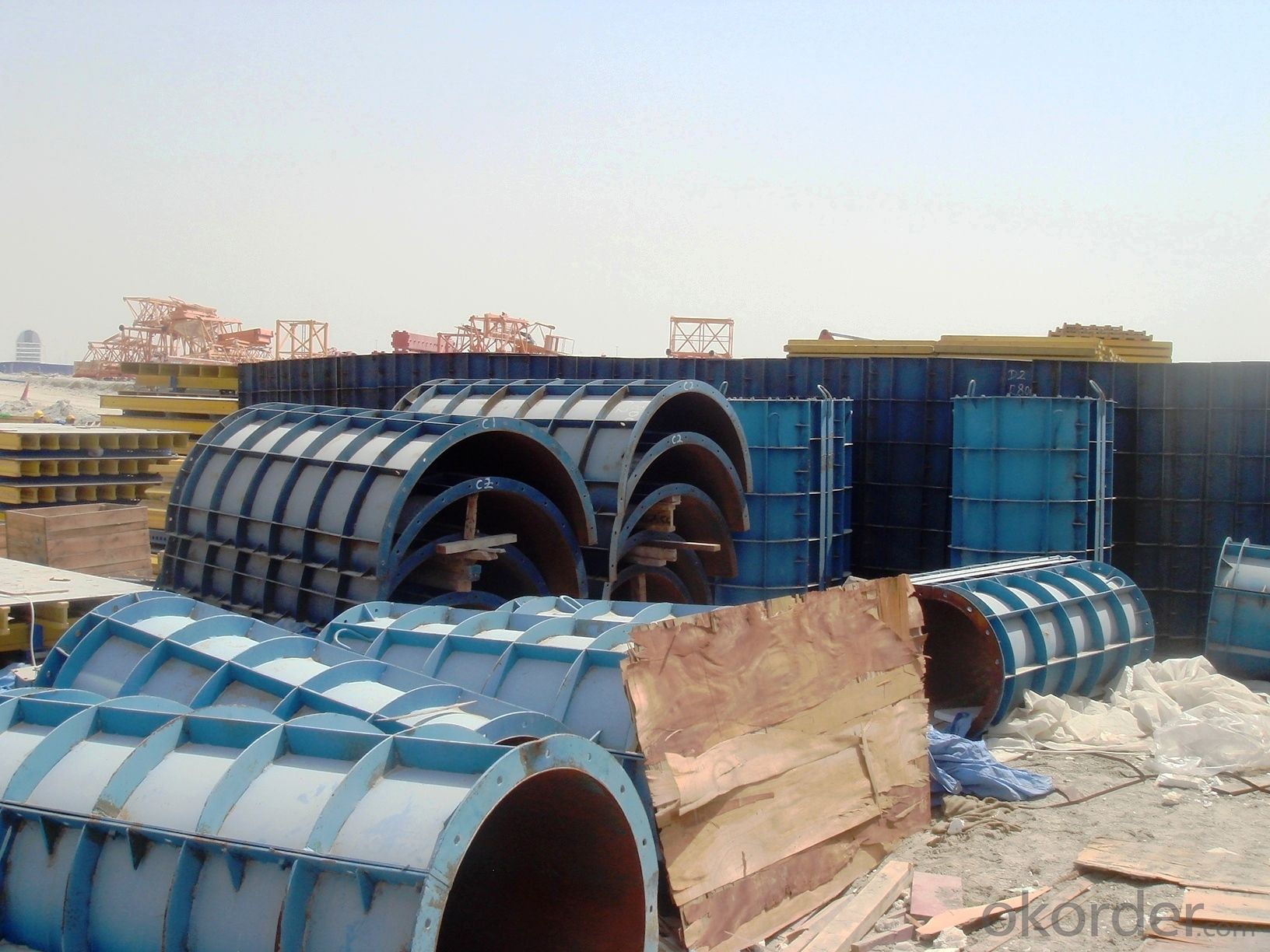
2. High stiffness guarantees perfect concrete shape;
3. The formwork can be moving as a whole unit, fast and repeatedly turnover is available.
Applications: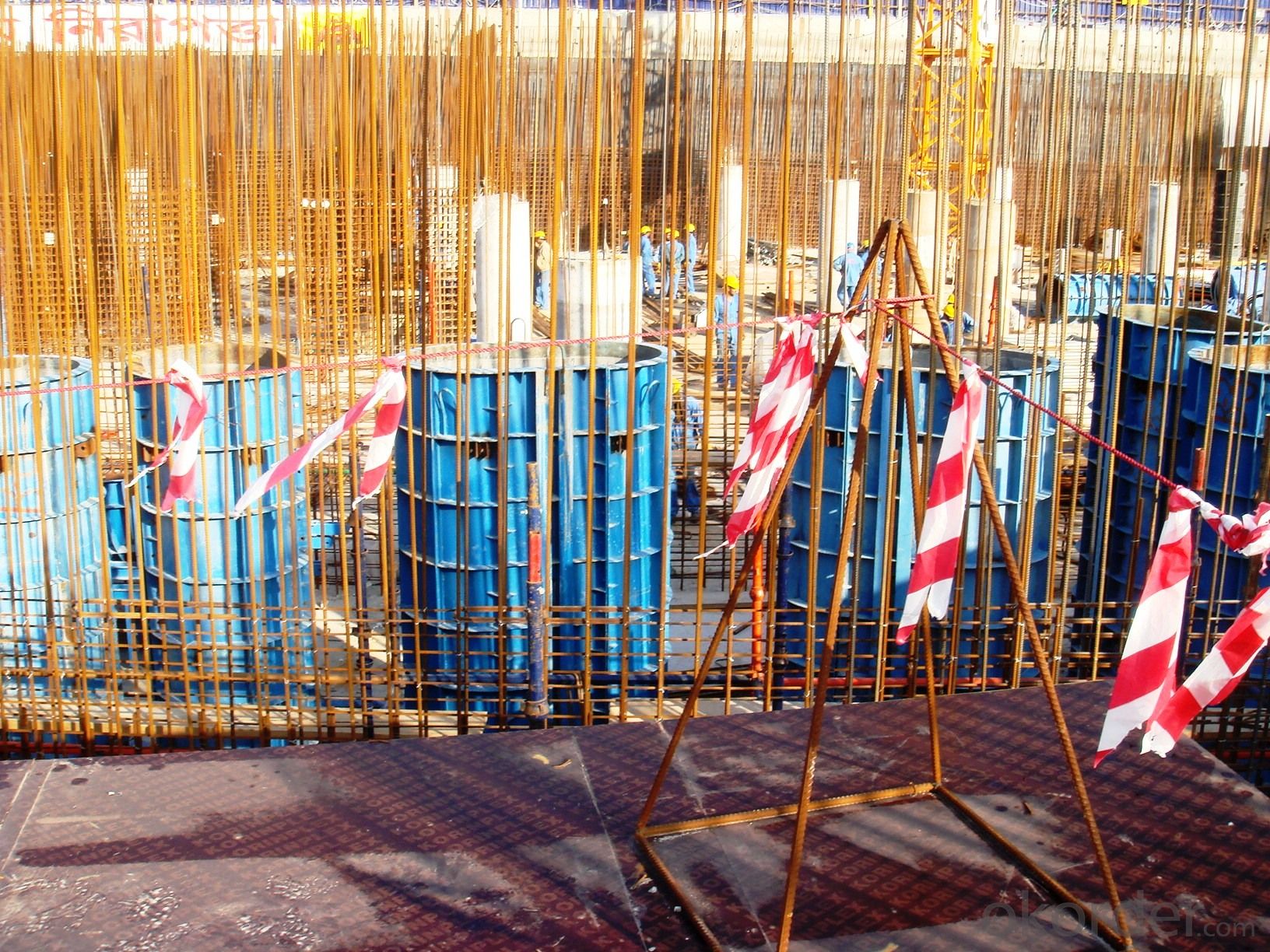
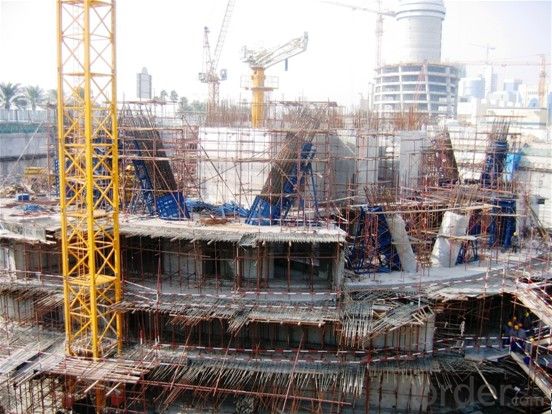
- Q: What are the different types of joints used in steel frame formwork?
- The different types of joints used in steel frame formwork include butt joints, lap joints, tongue and groove joints, and corner joints.
- Q: What type of concrete finishes can be achieved with steel frame formwork?
- Steel frame formwork is a versatile and robust system that enables the creation of various concrete finishes. With this formwork system, a range of finishes can be achieved, including smooth, textured, and decorative finishes. One of the most common concrete finishes achieved with steel frame formwork is a smooth finish. The steel frames provide a rigid structure that ensures the concrete is poured and compacted evenly, resulting in a smooth and even surface. This finish is ideal for areas that require a clean and polished look, such as walls, ceilings, and floors. In addition to smooth finishes, steel frame formwork can also be used to create textured finishes. By incorporating various patterns or textures onto the surface of the formwork, the concrete can be cast with a textured finish. This can include patterns like brickwork, wood grain, or any other desired texture. Textured finishes are often used to enhance the aesthetic appeal of architectural elements, such as facades, columns, or decorative walls. Furthermore, steel frame formwork can facilitate the creation of decorative finishes. Decorative finishes involve adding special coatings, pigments, or aggregates to the concrete mix to achieve a desired appearance. The steel frames provide the necessary support for intricate designs, shapes, or patterns. Decorative finishes are commonly used in high-end projects, such as museums, galleries, or luxury residences, where aesthetics play a significant role. Overall, the use of steel frame formwork allows for a wide range of concrete finishes to be achieved. From smooth and even surfaces to textured or decorative finishes, this formwork system provides the necessary support and flexibility to meet various design requirements.
- Q: Are there any specific requirements for the concrete mix used with steel frame formwork?
- Specific requirements exist for the concrete mix utilized in conjunction with steel frame formwork. To guarantee the structural integrity and strength of the construction, certain properties must be present in the concrete mix. To begin with, the concrete mix must possess a high compressive strength. This is imperative to withstand the pressure and weight exerted by the steel frame and other loads imposed on the structure. The exact compressive strength requirement will be contingent upon the design and intended purpose of the structure. Additionally, the concrete mix should exhibit favorable workability. It should be effortless to pour, compact, and mold within the steel frame formwork. This is crucial in achieving the desired shape and dimensions of the structure. The workability of the concrete can be enhanced by incorporating suitable admixtures, such as plasticizers or superplasticizers. Furthermore, the concrete mix should exhibit minimal tendencies for bleeding and segregation. Bleeding refers to the separation of water from the mix, while segregation refers to the separation of coarse aggregates from the mix. These issues can result in an uneven distribution of materials and compromise the overall strength and durability of the structure. Appropriate mix design and control can mitigate these problems. Lastly, the concrete mix should possess sufficient durability. It should possess resistance to environmental factors such as freeze-thaw cycles, chemical attacks, and abrasion. This is vital for the long-term performance and lifespan of the structure. The mix design should incorporate appropriate cementitious materials, aggregates, and admixtures to enhance the durability of the concrete. In conclusion, the concrete mix employed in conjunction with steel frame formwork necessitates high compressive strength, good workability, low bleeding and segregation tendencies, and adequate durability. These requirements guarantee the structural integrity and long-term performance of the construction.
- Q: How does steel frame formwork differ from other types of formwork?
- Steel frame formwork differs from other types of formwork in several ways. Firstly, steel frame formwork is made of steel, which makes it extremely strong and durable. It can withstand heavy loads and is resistant to warping or bending. This makes it ideal for construction projects that require a high level of strength and stability. Secondly, steel frame formwork is highly versatile. It can be easily customized and adjusted to fit different shapes and sizes of structures. This flexibility allows for the creation of complex and unique designs that may not be possible with other types of formwork. Additionally, steel frame formwork offers superior stability and accuracy. The steel frames provide excellent support and ensure that the formwork remains in place and does not shift during the pouring and curing of concrete. This results in better quality and more precise construction. Furthermore, steel frame formwork has a longer lifespan compared to other types of formwork. Its durability and resistance to wear and tear mean that it can be used for multiple projects, making it a cost-effective option in the long run. Lastly, steel frame formwork is relatively quick and easy to assemble and dismantle. The steel frames can be easily transported and assembled on-site, saving time and labor costs. This efficiency is especially beneficial for projects with tight deadlines or limited resources. In summary, steel frame formwork stands out from other types of formwork due to its strength, versatility, stability, durability, and ease of use. These qualities make it an excellent choice for construction projects that require a high level of performance and efficiency.
- Q: Can steel frame formwork be adjusted to different sizes and shapes?
- Steel frame formwork has the ability to adapt to various sizes and shapes. It is a versatile construction tool that can be easily adjusted and customized. By assembling and disassembling the frames, different dimensions and shapes can be accommodated for different construction projects. This flexibility enables the construction of walls, columns, beams, and other structural elements of different sizes and shapes. Furthermore, steel frame formwork can be combined with other formwork systems to enhance its adaptability even more, making it a popular choice among construction professionals.
- Q: How does steel frame formwork handle the placement of reinforcement bars?
- Steel frame formwork is a construction system that utilizes a steel frame structure to support concrete during the pouring and curing process. When it comes to the placement of reinforcement bars, steel frame formwork handles it in a highly efficient and effective manner. Firstly, steel frame formwork provides a sturdy and rigid structure that can easily accommodate the placement of reinforcement bars. The steel frames are designed to securely hold the bars in place, preventing any movement or displacement during the concrete pouring process. This ensures that the reinforcement bars are properly positioned and aligned, which is crucial for the structural integrity of the concrete element. Secondly, steel frame formwork typically includes specially designed accessories and components that facilitate the placement of reinforcement bars. These accessories, such as steel bars holders, spacers, and connectors, are integrated into the formwork system to ensure that the bars are correctly spaced and supported. This allows for precise positioning of the reinforcement bars according to the specified design requirements. Furthermore, steel frame formwork often provides adjustable features that allow for easy customization of the reinforcement bar placement. These adjustable elements, such as movable brackets or adjustable connectors, enable the formwork system to accommodate varying bar sizes and configurations. This flexibility ensures that the reinforcement bars can be installed in the most optimal positions, considering factors such as load distribution and structural requirements. In addition to the technical aspects, steel frame formwork also offers advantages in terms of time and labor efficiency when handling reinforcement bars. The steel frames can be easily assembled and disassembled, allowing for quick and convenient installation of the reinforcement bars. This helps to reduce construction time and labor costs, making steel frame formwork a popular choice among contractors and builders. Overall, steel frame formwork provides a robust and versatile system for handling the placement of reinforcement bars. Its ability to securely hold and support the bars, along with its adjustable features and time-saving benefits, makes it an effective solution for ensuring proper reinforcement in concrete structures.
- Q: How does steel frame formwork contribute to the overall fire resistance of a structure?
- Steel frame formwork contributes to the overall fire resistance of a structure in several ways. Firstly, steel is known for its high melting point and excellent heat resistance. This means that it can withstand high temperatures for longer periods of time before it starts to lose its structural integrity. In the event of a fire, the steel frame formwork acts as a barrier, protecting the structure from the direct heat of the flames and preventing the spread of fire to other parts of the building. Additionally, steel frame formwork has the ability to retain its strength even at elevated temperatures. This is crucial in maintaining the structural stability of the building during a fire. Unlike other construction materials, such as wood or concrete, steel does not weaken or lose its load-bearing capacity when exposed to high temperatures. This ensures that the structure remains intact and reduces the risk of collapse. Moreover, steel is non-combustible, meaning it does not ignite or contribute fuel to a fire. This characteristic further enhances the fire resistance of the structure as it helps to contain the fire within a specific area and prevents it from spreading to other parts of the building. By confining the fire to a limited space, steel frame formwork allows for easier and safer evacuation of occupants and provides more time for firefighting efforts. Furthermore, steel frame formwork is often used in conjunction with fire-resistant materials, such as fire-resistant insulation and fire-rated coatings. These additional measures enhance the fire resistance of the structure by providing an extra layer of protection against the heat and flames. The combination of steel frame formwork and fire-resistant materials creates a robust fire-resistant system that significantly improves the overall fire safety of the building. In conclusion, steel frame formwork contributes to the overall fire resistance of a structure by providing a strong and heat-resistant barrier, retaining its load-bearing capacity at high temperatures, being non-combustible, and working in tandem with fire-resistant materials. By incorporating steel frame formwork into the construction process, the risk of fire-related damage and the potential for loss of life can be greatly reduced.
- Q: Are steel frame formwork panels adjustable in size?
- Yes, steel frame formwork panels are adjustable in size. They can be easily modified and resized to fit different dimensions and shapes required for various construction projects.
- Q: Can steel frame formwork be used in projects with limited construction site amenities or utilities?
- Yes, steel frame formwork can be used in projects with limited construction site amenities or utilities. Steel frame formwork is a versatile and durable solution that can be easily transported and assembled on-site. It does not rely on external utilities such as electricity or water, making it suitable for projects in remote areas or with limited access to amenities. Additionally, steel frame formwork can be reused multiple times, reducing the need for frequent material replacements and minimizing the demand for on-site resources.
- Q: Are there any restrictions on the thickness of the concrete that can be poured using steel frame formwork?
- Yes, there are restrictions on the thickness of concrete that can be poured using steel frame formwork. The thickness usually depends on the design and specifications of the steel formwork system being used. It is important to consult the manufacturer or design engineer to determine the maximum recommended thickness for pouring concrete using steel frame formwork.
Send your message to us
High Stiffness Concrete Column Formwork
- Loading Port:
- China Main Port
- Payment Terms:
- TT OR LC
- Min Order Qty:
- -
- Supply Capability:
- -
OKorder Service Pledge
OKorder Financial Service
Similar products
Hot products
Hot Searches
Related keywords
